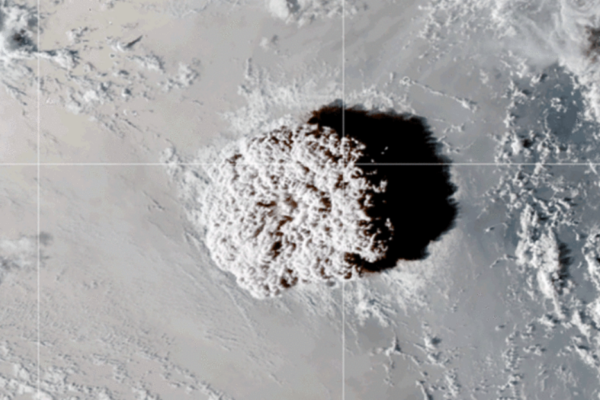The headline you haven’t seen: “Tonga Eruption Blasted Unprecedented Amount of Water Into Stratosphere.” That’s from NASA. The text accompanying some impressive time-lapse imagery notes, “The sheer amount of water vapor could be enough to temporarily affect Earth’s global average temperature.”
Water vapor is the single biggest driver of …climate change. No, it is not CO2, its negligible 0.04% of the atmosphere or your minuscule 3% of that 0.04%.
Volcanic eruptions rarely inject much water into the stratosphere. In the 18 years that NASA has been taking measurements, only two other eruptions – the 2008 Kasatochi event in Alaska and the 2015 Calbuco eruption in Chile – sent appreciable amounts of water vapor to such high altitudes. But those were mere blips compared to the Tonga event, and the water vapor from both previous eruptions dissipated quickly. The excess water vapor injected by the Tonga volcano, on the other hand, could remain in the stratosphere for several years.
This extra water vapor could influence atmospheric chemistry, boosting certain chemical reactions that could temporarily worsen depletion of the ozone layer. It could also influence surface temperatures. Massive volcanic eruptions like Krakatoa and Mount Pinatubo typically cool Earth’s surface by ejecting gases, dust, and ash that reflect sunlight back into space. In contrast, the Tonga volcano didn’t inject large amounts of aerosols into the stratosphere, and the huge amounts of water vapor from the eruption may have a small, temporary warming effect, since water vapor traps heat. The effect would dissipate when the extra water vapor cycles out of the stratosphere and would not be enough to noticeably exacerbate climate change effects.
A year later, the press has its dander up about heat waves, record heat, and how you’re lazy Western lifestyle is to blame—wrong answer. Your meaningless emissions are, well, meaningless. Yes, humans can pollute the biosphere. We need only look to mining for rare earth metals in Africa or to China, the world’s largest polluter, and emitter, which is also the leading producer of wind turbines and solar panels.
The irony is lost on many, like the massive water vapor injection into the upper atmosphere.
Thomas Lifson, writing at The American Thinker, adds,
From the European Space Agency:
In a recent paper published in Nature, a team of scientists showed the unprecedented increase in the global stratospheric water mass by 13% (relative to climatological levels) and a five-fold increase of stratospheric aerosol load — the highest in the last three decades.
Using a combination of satellite data, including data from ESA’s Aeolus satellite, and ground-based observations, the team found that due to the extreme altitude, the volcanic plume circumnavigated the Earth in just one week and dispersed nearly pole-to-pole in three months. [emphasis added]
and …
So there you have it: we are in for extra atmospheric heat “for several years” until the extra water vapor injected by this largest-ever-recorded underwater volcano eruption dissipates.
Jeff Childers, who brought these scientific data to my notice, writes:
Here’s why corporate media is ignoring the most dramatic climate even[t] in modern history: because you can’t legislate underwater volcanoes. You can try, but they won’t listen. So what’s the fun in that? Corporate media only exists to further political ends. Since volcanoes aren’t subject to politics, why bother?
Even when NASA scientists explain the science of water vapor – especially of this magnitude – and how it will increase the global temperature, “the Tonga eruption sent around 146 teragrams (1 teragram equals a trillion grams) of water vapor into Earth’s stratosphere – equal to 10% of the water already present in that atmospheric layer“), it is not the science they are looking for.
None of their experts are even suggesting it because the approved narrative is that you are heating the water and that heat is heating you, neither of which is true.
But that’s their science, and the truth makes you the denier.
American Thinker | NASA
